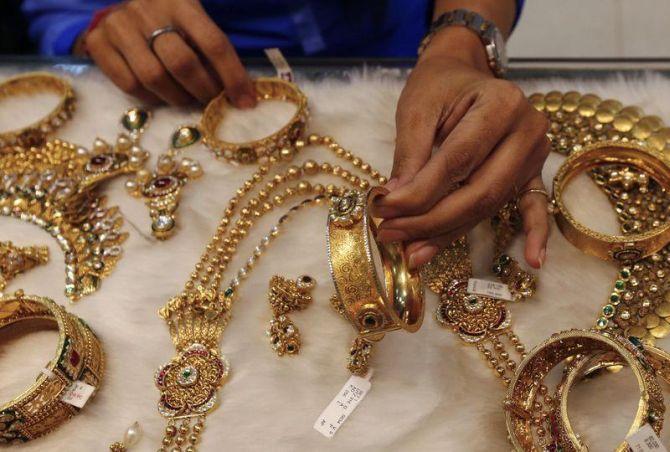The options include involving jewellers as collection centres, addressing of issues that banks have been facing and using domestically available gold for giving metal loans to jewellers for domestic sales.

All-out efforts are being made to revive the Gold Monetisation scheme, which failed to take off since its launch two years ago.
The aim of this scheme was to mobilise “idle gold” with households, estimated by the World Gold Council at 25,000 tonnes or almost half the value of this country’s gross domestic product.
However, the scheme has not even attracted 10 tonnes since the launch in November 2015. Even this has mostly been from temples, not homes.
Suggestions on how to revive it are being discussed by a panel formed by the Niti Aayog.
These include involving jewellers as collection centres, addressing of issues that banks have been facing and using domestically available gold for giving metal loans to jewellers for domestic sales.
According to information from the Association of Gold Refineries and Mints say around 10 refineries and 50 gold collection centres (hallmarking centres) are licensed to accept gold under the scheme and consumers keep making inquiries.
“However, we are not ready to accept gold as deposits, as the operating banks are not ready at their end to accept these, for a variety of reasons,” said James Jose, the Association’s secretary.
Banks, says an industry official, are not finding it viable to accept gold deposits from investors for less than 500g.
Even for bulk deposits, the interest for medium-term and long-term ones is yet to be reimbursed by the government; the latter is yet to even prepare the operative guidelines on this.
So, bankers want the government to clarify how it wishes GMS to progress.
Sanjeev Agrawal, chairman of the Gems & Jewellery Committee at business chamber Ficci, said: “Jewellers can be involved in GMS, as they enjoy customers’ confidence; customers might be ready to part with their jewellery as deposits under GMS. Jewellers certified by the Bureau of Indian Standards should be allowed to act as agents of banks to collect deposits under GMS; their acknowledgement could be used by banks for opening and crediting depositors’ account with that much gold.”
Adding: “We propose that jewellers shall be allowed to accept such deposits and gold can be lent back to jewellers as metal loans at pre-approved rates; eligibility criteria could be fixed by the respective banks.
This will make the scheme practical for banks to handle, as handling a smaller quantity of gold is routine for jewellers and might not be viable for banks.”
Banks, however, are reluctant to support this.
Another suggestion is to allow jewellers to accept gold as deposits and pay interest to depositors, using that gold for jewellery and then return this to depositors on agreed terms, the way they accept cash deposits.
Agrawal says around 140 tonnes of gold jewellery are sold annually to jewellers, for encashing or buying new jewellery.
James Jose observes: “The GMS deposit interest rate is over two per cent, which is costlier if the same gold is to be lent back to jewellers. From international sources, such loans are available at 1.5 per cent.
To tackle this, metal loans from overseas could be made permissible to only exporters, which might motivate banks to push GMS.”
Another suggestion he has given to the ministry of finance is that, “banks would be motivated to push GMS if they are allowed to lend gold to domestic jewellers for more than one year against collateral. And, metal loans shall be denominated in gold weight and repaid in gold weight.”
Photograph: Shailesh Andrade/Reuters











